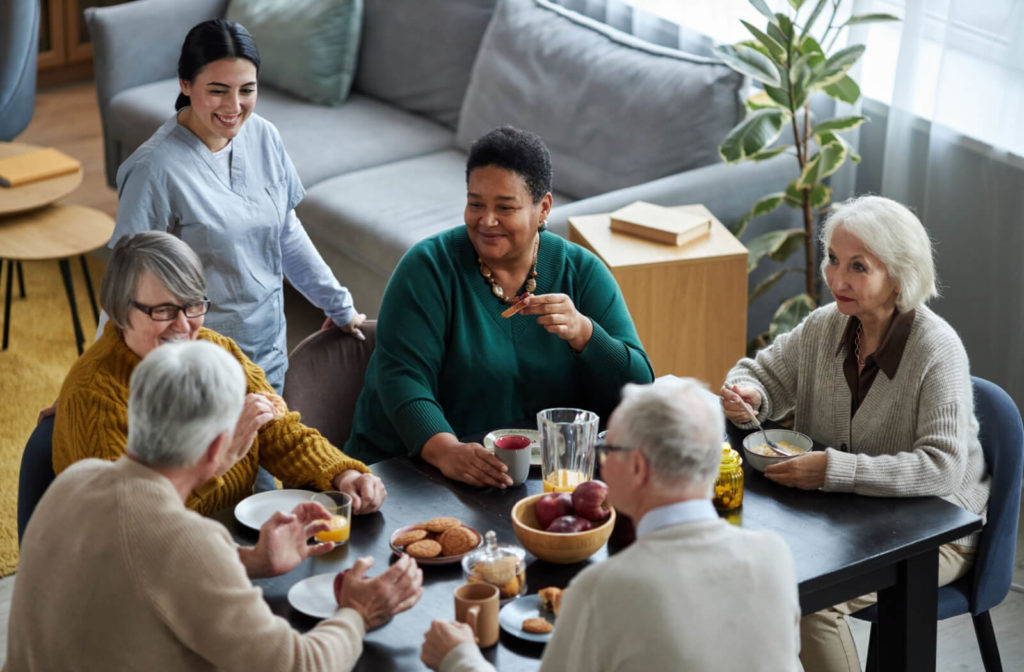Find trusted Assisted Living communities with excellent care services.
Find trusted Assisted Living communities with excellent care services.
Blog Article
Just How Aided Living Facilities Enhance Lifestyle for Those With Dementia
The combination of appealing programs and household involvement further enriches the locals' experience. The complexities of mental deterioration care continue to progress, prompting a better evaluation of just how these facilities adjust and innovate to meet the challenges faced by residents and their households.
Personalized Care Plans
(Dementia Care Charlotte)In a lot of cases, individuals with dementia require customized support that resolves their one-of-a-kind requirements and preferences. Individualized treatment plans are important in assisted living settings, as they make sure that each resident obtains appropriate focus and solutions. These plans are developed collaboratively, involving healthcare experts, caretakers, and member of the family to develop a detailed introduction of the individual's case history, cognitive capabilities, and individual passions.
A well-structured individualized care plan generally consists of specific goals associated with health management, everyday activities, and social involvement. It makes up the person's cognitive decrease while advertising independence and self-respect. Routine assessments and updates to the care strategy are important, as they enable modifications based upon the homeowner's advancing condition and preferences.
Secret components of these plans typically entail drug monitoring, behavioral assistance methods, and dietary standards tailored to the person's demands (Memory Care). By focusing on customized treatment, assisted living facilities can cultivate an encouraging setting that boosts the lifestyle for people with dementia, inevitably adding to their total well-being and happiness. This personalized technique appreciates the uniqueness of each local, guaranteeing they get the thoughtful care they require

Involving Activities and Programs
Involving residents in purposeful tasks and programs is vital for improving the high quality of life for individuals with mental deterioration. These activities not only provide pleasure but additionally promote cognitive function and advertise social interaction, which can minimize feelings of seclusion usually experienced by homeowners.

In addition, tailored programs are crucial in making sure that each local's unique choices and capacities are acknowledged. This customized method urges involvement, boosts self-confidence, and gives a sense of achievement.
Additionally, normal evaluations of citizens' passions can assist team customize and adapt activities to much better fit evolving requirements. By focusing on appealing tasks and programs, helped living facilities can substantially enhance the total experience and emotional health and wellness of people living with dementia.
Safe and Supportive Environment
Creating a risk-free and helpful setting is necessary for people with dementia, as it directly affects their health and lifestyle. Aided living facilities are designed with specific attributes that promote safety while promoting a feeling of security and comfort. These environments focus on accessibility, with formats that minimize confusion and encourage freedom, permitting residents to navigate their environments much more easily.
Precaution, such as protected entrances and exits, avoid roaming and unapproved access, which are crucial factors to consider for people with mental deterioration (Memory Care). Personnel are educated to acknowledge the special demands of residents, giving customized assistance and supervision to ensure their security. Additionally, the incorporation of relaxing colors and familiar items can help decrease anxiety and disorientation, producing a much more calming atmosphere.
In addition to physical safety and security, emotional assistance is paramount. Facilities usually utilize personnel who are not just knowledgeable in caregiving yet also learnt compassion and interaction, cultivating count on and rapport with locals. This alternative method adds to a caring atmosphere where individuals really feel valued and recognized, ultimately improving their overall lifestyle.
Social Interaction and Neighborhood
A helpful environment not only prioritizes safety and security however also cultivates opportunities for social communication and neighborhood involvement, which are important for people with mental deterioration. In assisted living centers, organized activities and public rooms urge citizens to get in touch with one an additional, lowering sensations of isolation often experienced by those with cognitive disabilities.
Social communication plays a considerable function in improving emotional well-being and cognitive function (Memory Care). Engaging with peers in team tasks such as video games, arts and crafts, or workout not only boosts cognitive capacities however also supports a sense of belonging. Facilities usually arrange events that advertise socialization, permitting residents to construct connections and share experiences, which can be specifically advantageous for those with mental deterioration
Furthermore, a click here now lively neighborhood environment can enhance the total lifestyle for residents. Employee are educated to facilitate interactions and assistance citizens in developing purposeful links. By producing a culture of engagement, assisted living facilities help individuals with mental deterioration preserve social abilities and enhance their mood, eventually adding to an extra fulfilling life experience. This community-oriented approach is vital in taking care of the obstacles associated with mental deterioration, advertising a sense of objective and continuity for homeowners.
Household Participation and Support
Household participation is crucial in sustaining individuals with dementia in assisted living settings. Proactively involving member of the family not only provides psychological comfort to residents however also promotes a sense of belonging and continuity in their lives. When families participate in care planning and daily tasks, they contribute valuable insights concerning the individual's choices, background, and requires, which can improve personalized treatment.
Additionally, normal family members visits can substantially enhance the emotional wellness of residents, decreasing feelings of isolation and anxiousness. Relative can likewise assist in keeping cognitive function by engaging their enjoyed ones in familiar discussions and tasks. This communication reinforces individuality and aids citizens feel valued and understood.

Conclusion
To conclude, assisted living facilities considerably improve the lifestyle for people with dementia via individualized treatment strategies, involving activities, and a risk-free setting. These aspects foster cognitive stimulation, psychological well-being, and a feeling of self-reliance. Moreover, regular social interactions and strong family members involvement add to meaningful links and psychological assistance. Collectively, these variables develop an alternative method to care that addresses the one-of-a-kind needs of individuals with dementia, advertising total well-being and self-respect.
Report this page